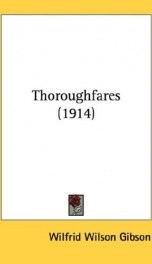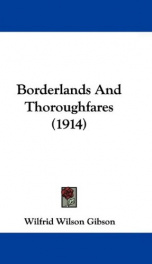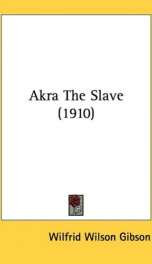Gibson Wilfrid Wilson

Wilfrid Wilson Gibson (October 2, 1878 - May 26, 1962), was a British poet, associated with World War I but also the author of much later work. Gibson was born in Hexham, Northumberland and left the north for London in 1912 after his father died. He had been publishing poems in magazines since 1897, and the collections Stonefolds, On The Threshold, were published by the Samurai Press in 1907, and followed by The Web of Life in 1908.[1] Despite his residence in London and later on in Gloucestershire, many of Gibson's poems both then and later, have Northumberland settings: 'Hexham's Market Cross'; 'Hareshaw'; and 'The Kielder Stone'. Others deal with poverty and passion amid wild Northumbrian landscapes. Still others are devoted to fishermen, industrial workers and miners, often alluding to local ballads and the rich folk-song heritage of the North East. It was in London that he met both Edward Marsh and Rupert Brooke, becoming a close friend and later Brooke's literary executor (with Lascelles Abercrombie and Walter de la Mare).[2] This was at the period when the first Georgian Poetry anthology was being hatched. Gibson was one of the insiders.[3] During the early part of his writing life, Wilfrid Wilson Gibson wrote poems that featured the "macabre." One such poem is Flannan Isle, based on a real life mystery. Gibson was one of the founders of the so-called ”Dymock Poets”, a community of writers who settled briefly, before the outbreak of the Great War, in the village of Dymock, in north Gloucestershire.[4] He never saw active service during his brief time as an army private, but his poetry belies his lack of experience, Breakfast written in the book "Up To The Line Of Death - The War Poets 1914-1918" is a prime example of ironic war verse written during the very early stages of the conflict. Another example of his war-time poetry is Back. In this poem the speaker wonders how to respond to the questions about what the speaker did in the war. The speaker does not believe that it was his true self who went across, however he knows that physically it was him. On November 11th, 1985, Gibson was among 16 Great War poets commemorated on a slate stone unveiled in Westminster Abbey's Poet's Corner[5]. The inscription on the stone was written by a fellow Great War poet, Wilfred Owen. It reads: "My subject is War, and the pity of War. The Poetry is in the pity."[6] His reputation was eclipsed somewhat by the Ezra Pound-T. S. Eliot school of Modernist poetry[7][8]; his work remained popular.
do you like this author?
What readers are saying
What do you think? Write your own comment on this book!
write a commentWhat readers are saying
What do you think? Write your own comment on this author!
write a commentBook list
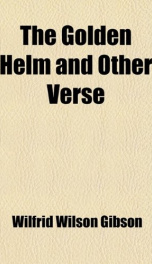
the golden helm and other verse
Series:
Unknown
Year:
Unknown
Raiting:
4/5
Purchase of this book includes free trial access to www.million-books.com where you can read more than a million books for free. This is an OCR edition with typos. Excerpt from book: The Knight of the Wood " T FEAR the Knight of the Wood," she said: " For him may no man overthrow. Where boughs are matted thick o'erhead, There gleams, amid the shadows dread, The terror of his armour red ; And all men fear him, high and low ; Yet all must through the forest go." She paused awhile where larches flame About the borders of the wood ; Then, crying loud on Love's high name To keep her maiden-heart from shame, She entered, and full-swiftly came Where, hooded with a scarlet hood, A rider in her pathway stood. She saw the gleam of armour red ; She saw the fiery pennon wave Its flaming terror overhead 'Mid writhing boughs and shadows dread. " Ah God," she cried : " that I were dead, And laid for ever in my grave! " Then, swooning, called on Love to save. Among the springing fern she fell, And very nigh to death she lay ; Till, like the fading of a spell At ringing of the matin-bell, The darkness left her; by a well She waked beneath the open day, And rose to go upon her way; When, once again, the ruddy light Of arms she saw, and turned to flee ; But clutching brambles stayed her flight; While, marvelling, she saw the Knight Unhooded ; and his eyes were bright With April colours of the sea; And crowned as a King was he. She knelt before him in the ferns, And sang: "O Lord of Love, I bow Before thy shield, where blazoned burns The flaming heart with light that turns The night to day. O heart that yearns For love, lo, Love before thee now The wild-wood knight with crowned brow ! " Notre Dame de la Belle -Verriere A BOVE Thy halo's burning blue For ever hovers the White Dove ; Thy heart enshrines, for ever new, The Crossthe Crown of all Thy love; While, sapphire wing on sapphire wing, About Thee choiring angels swing G...
Show more
add to favoritesadd In favorites
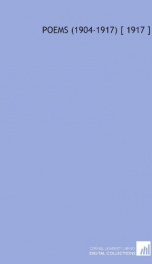
poems 1904 1917
Series:
Unknown
Year:
Unknown
Raiting:
3/5
Originally published in 1917. This volume from the Cornell University Library's print collections was scanned on an APT BookScan and converted to JPG 2000 format by Kirtas Technologies. All titles scanned cover to cover and pages may include marks notations and other marginalia present in the original volume.
Show more
add to favoritesadd In favorites

neighbours
Series:
Unknown
Year:
Unknown
Raiting:
4/5
Purchase of this book includes free trial access to www.million-books.com where you can read more than a million books for free. This is an OCR edition with typos. Excerpt from book: BARBARA FELL Stephen, wake up! There's someone at the gate. Quick, to the window. . . . Oh, you'll be too late! I hear the front door opening quietly. Did you forget last night to turn the key? A foot is on the stairs nay, just outside The very room the door is opening wide. . . . Stephen, wake up! Wake up! Who's there? Who's there? I only feel a cold wind in my hair. . . . Have I been dreaming, Stephen ? Husband, wake And corn fort me: I think my heart will break. I never knew you sleep so sound and still. . . . O my heart's love, why is your hand so chill ? chapter{Section 4j KATHERINE WEIR 'Though I have been a none-too-happy wife, And now my children grow away from me, Bringing to old age fresh anxiety, I have been used; and to be used by life, Even ill-used and broken utterly With every faith betrayed and trust abused, Is a kinder lot than in security To crumble coldly to the grave, unused. chapter{Section 5ESTHER MILBURN Once realised, what else was left to do But part and go our separate ways anew ? I've not set eyes upon him since that night. Why did we marry ? Why did that paper light I held the match to? Yes, it's gone black out, Leaving the sticks unkindled, and no doubt The fire must be relaid before 't will burn. But when love fails there is no second turn. If once the paper doesn't fire the wood, Or the blazing wood, the coal, there's little good In striking matches to eternity: They only spurt and flicker mockingly, Scorching the fingers, to illuminate Charred litter in the cold bars of the grate. chapter{Section 6PHILIP AND PHOEBE WARE Who is that woman, Philip, standing there Before the mirror doing up her hair? You're dreaming, Phoebe, or the morning light Mixing and mingling with the dying night Makes sh...
Show more
add to favoritesadd In favorites
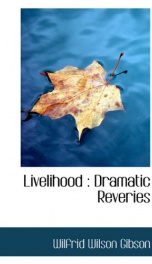
livelihood dramatic reveries
Series:
Unknown
Year:
Unknown
Raiting:
4/5
This scarce antiquarian book is included in our special Legacy Reprint Series. In the interest of creating a more extensive selection of rare historical book reprints, we have chosen to reproduce this title even though it may possibly have occasional imperfections such as missing and blurred pages, missing text, poor pictures, markings, dark backgrounds and other reproduction issues beyond our control. Because this work is culturally important, we have made it available as a part of our commitment to protecting, preserving and promoting the world's literature. --This text refers to an alternate Paperback edition.
Show more
add to favoritesadd In favorites
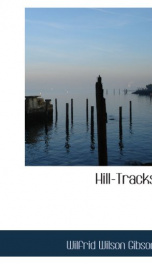
hill tracks
Series:
Unknown
Year:
Unknown
Raiting:
4/5
HILL-TRACKS - 1918 - Contents - OTTERBUR . N MERRY E YE HIGH CUP NICK . YEAVERINBGE LL . THER AGGEDST ONE . SKIRLNAKED THE CROWDER . THE K EILDERS TONE . CRUEL AND BRIGHT . FALLOWFIEFIE DL L . OLD SKINFLINT . DINLABYR . E UNTHANK . AMBULANCTER AIN . MUGGI. ESWICI . Ho YOICKS LOVELADSYH IELD . EOURTON-ON-THE-WAT . E R STOW-ON-THE-WOL . D OLD MEG . NORTHLEACH . THE U G G E R S S ONG . CURI. EWC ALLING . HARESHAW . WINTERS ST OB . PITY ME . 0 WHAT SAW YOU. HAGGIE K NOWE . ARRAS WATER . BLACKS TITCHE . I . PEDLARJA CK . - TI I E , O NELYT REE . 9 Contents PAGE 46 48 H I L L - T R A C K S --This text refers to an alternate Paperback edition.
Show more
add to favoritesadd In favorites
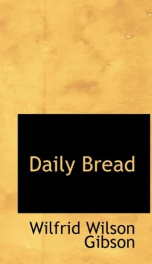
daily bread
Series:
Unknown
Year:
Unknown
Raiting:
3/5
Originally published in 1916. This volume from the Cornell University Library's print collections was scanned on an APT BookScan and converted to JPG 2000 format by Kirtas Technologies. All titles scanned cover to cover and pages may include marks notations and other marginalia present in the original volume.
Show more
add to favoritesadd In favorites

battle
Series:
Unknown
Year:
Unknown
Raiting:
4.5/5
Many of the earliest books, particularly those dating back to the 1900s and before, are now extremely scarce and increasingly expensive. We are republishing these classic works in affordable, high quality, modern editions, using the original text and artwork. --This text refers to an alternate Paperback edition.
Show more
add to favoritesadd In favorites
What readers are saying
What do you think? Write your own comment on this author!
write a commentif you like Gibson Wilfrid Wilson try:
readers also enjoyed
What readers are saying
What do you think? Write your own comment on this author!
write a commentGenre
if you like Gibson Wilfrid Wilson try:
readers also enjoyed
Do you want to exchange books? It’s EASY!
Get registered and find other users who want to give their favourite books to good hands!

